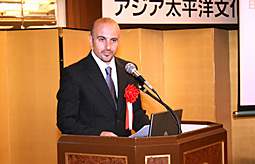 The 6th Iue Asia Pacific Research Prize Winner: Nissim Kadosh Otmazgin
The 6th Iue Asia Pacific Research Prize Winner: Nissim Kadosh Otmazgin
Title of Dissertation:"Regionalizing Culture :The Political Economy of Japanese Culture in East and Southeast Asia, 1988-2005"

- Winner: Nissim Kadosh Otmazgin
-
- 【Career】
Nissim Kadosh Otmazgin received his B.A. in Political Studies and Japanese Studies (double major) from the Hebrew University of Jerusalem in September 2000. In April 2001, he entered Kyoto University under the Japanese Government Scholarship Program. He received his Ph.D. in Area Studies from the Graduate School of Asian and African Area Studies, Kyoto University in March 2007. Since April 2007, he has been a researcher at the Center for Southeast Asia, Kyoto University.
Throughout his studies, he has been fascinated from the possibility of analyze and explain social phenomenon in both methods social science as well as through area specialty.
- 【Career】
During the last two decades, Japanese cultural industries have penetrated East and Southeast Asia’s markets and their products have been widely disseminated and consumed. In this region, they have created new markets for their products and services and invigorated cooperation among those involved in the commodification and commercialization of culture. The proliferation of Japanese culture in East and Southeast Asia has also been swiftly changing Japan’s image, paving inroads to a variety of young urban audiences. The aim of this study is to explore the connection between the commodification of culture and the dynamics of regionalization by examining the activities of Japanese cultural industries in East and Southeast Asia over the last two decades. It focuses on the process by which Japanese music and television companies have expanded into this region, the creation of markets for Japanese cultural commodities there, and the region-wide cultural-industrial influence that Japanese culture has had. An attempt is made to go beyond state-centric explanations of regionalization and examine the way culture affects regional formation.






